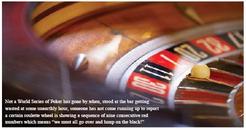






Antepost: Subconscious Psychological Biasesby Roy Brindley | Published: Dec 01, 2009 |
|
|

What’s the difference between the typical roulette wheel now and average roulette wheel of 25 years ago? In essence absolutely nothing; the roulette wheel is still a simplistically brilliant gambling medium.
However the game has been sped up in recent years with the introduction of chipping machines which colour and stack up chips for the croupier saving them this tedious and time consuming chore. Resultantly there are now more spins per hour and that means greater profitability for the casino.
This is not the only way the roulette layout has been altered to increase turnover. Those displays listing the sequence of previous numbers are also a relatively new initiative and would you believe their introduction has also resulted in increased profitability?
Not a World Series of Poker has gone by when, stood at the bar getting wasted at some unearthly hour, someone has not come running up to report a certain roulette wheel is showing a sequence of nine consecutive red numbers which means “we must all go over and lump on the black!”
Sure enough the gang pool together $500 and our messenger runs off to place the bet. Returning moments later, to a band of disgruntled and disbelieving gamblers, he insists that we should “go again” as it “cannot come in red for an eleventh time!”
Clearly if these electronic display boards were of practical use to punters, enhancing their chances of winning in any way, they would not be dotted around every gaming floor in the world. They tune into subconscious psychological biases making people, like our group ensconced at the bar with no intention of having a bet, place one.
You could argue our bet was the result of rational behaviour, as black numbers are supposed to come up 50 percent of the time and it hadn’t done so for nine spins.
Yet it was irrational behaviour that led us to place the bet as our sample came from just 10 spins and not from a realistic sample, of say, the last 500 spins of the wheel. What’s more the roulette ball has no memory of where it landed before and every spin is independent of the last.
So our bet was the result of subconscious superstition and that led us to be irrationally biased. It’s what casinos thrive on, it’s the reason lottery winners get publicity — to make the several millions of unsuccessful ticket buyers believe their chances of winning are greater than they actually are.
This psyche is also the reason research has shown craps players who want high numbers throw the dice with more ferocity than on the occasions they are attempting to throw low numbers.
Psychological biases explain away so much of what we do when gambling, it’s why some poker players have lucky charms at the table, why others never change their lucky jumper (I’m giving some people the benefit of the doubt here) and possibly why I’ll not back a two-year-old favourite at Brighton, oppose the Patriots in the National Football League, or pass an ace-king in a televised one-table tournament. 
Features
From the Publisher
The Inside Straight
Online Zone
Industry News
Featured Columnists
Strategies & Analysis
Wager Zone
Commentaries & Personalities